|
Progressive Men of Iowa
1899
Progressive Men
Index
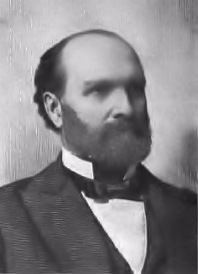 DUNCOMBE, John Francis, of Fort Dodge, is,
and has been, for more than forty years, one of the best
known citizens of Iowa. He is a direct descendant from
the Duncombes of England, several of whom have, in
different generations, served their country in
parliament and other public positions. Charles Duncombe,
from whom the American branch of the family has
descended, was a staunch patriot in revolutionary days.
Out of his large fortune he contributed more than
$60,000 in aid of the struggle of the colonies for
independence.
He gave his life as well as a large share of his
fortune to the patriot cause in the war for national
freedom. His son, the grandfather of John F., was a
volunteer in the American army in the second war with
Great Britain, in 1812. DUNCOMBE, John Francis, of Fort Dodge, is,
and has been, for more than forty years, one of the best
known citizens of Iowa. He is a direct descendant from
the Duncombes of England, several of whom have, in
different generations, served their country in
parliament and other public positions. Charles Duncombe,
from whom the American branch of the family has
descended, was a staunch patriot in revolutionary days.
Out of his large fortune he contributed more than
$60,000 in aid of the struggle of the colonies for
independence.
He gave his life as well as a large share of his
fortune to the patriot cause in the war for national
freedom. His son, the grandfather of John F., was a
volunteer in the American army in the second war with
Great Britain, in 1812.
Eli Duncombe, the father of John F., was a farmer
in Erie county, Pa., in moderate circumstances. His son was born
on the farm October 22, 1831. His education began in a
log school house, and when 16 years of age, he was sent
to Allegheny college, at Meadville, where he pursued his
studies for three years. From there he went to Centre
college, at Danville, Ky., where he graduated with high
honors, in June, 1852, and, returning to Allegheny
college, graduated there the same month. Afterwards,
Allegheny college conferred on him the degree of A. M.
During his college course Mr. Duncombe taught
school during vacations to procure the means to defray
his expenses, beginning to teach before he was 17 years
of age. After leaving college he studied law at Erie,
Pa., was admitted to the bar and entered into practice
in 1853.
December 29,1852, he was married to Miss Carrie
Perkins, who died November 19, 1854, at Erie, where they
had settled.
In 1855 Mr. Duncombe borrowed $300 from his
father, having surrendered his interest in the paternal
estate in consideration of money advanced to meet
college expenses, and with that small sum as his entire
fortune, boldly struck out for the west to make his way
in the world. He pushed on out to the little frontier
town of Port Dodge, Iowa, then (in April, 1855), a
village of a few hundred inhabitants, remote from
railroads, and surrounded by vast, wild, unbroken
prairies. Here he opened a law office in a county that
had a population of but little more than 1,000 people,
counting men, women and children. The land in all
directions still belonged to the government, with the
exception of isolated claims along the streams where
timber and springs could be found. The pioneers had
little money and seldom indulged in the luxury of
litigation. The prospect for profitable law business was
in the remote future, and chiefly upon such anticipation
the sanguine young attorney somehow managed to live in a
style that was far from luxurious. He had faith in the
development of a region rich in nature's elements of
wealth, which the hopeful and vigorous young pioneers
were determined to hasten by every energy they were
endowed with.
It was a long, hard, slow process of evolution,
but Mr. Duncombe, and a few others, stuck to the
beautiful location, and were powerful factors in working
out the transition from poverty, in the bleak wilderness
of water soaked, muskrat populated marshes, to a garden
spot of well tilled farms, and a city of thrift, wealth,
culture and refinement. Year by year, the old trail of
Indians, buffalo, hunters and trappers were gradually
effaced by plow, cultivator, wagon and railroad. With
youth, energy, sanguine expectations and unflagging
courage, the young men who sought homes in the wilds of
northwestern Iowa, could not fail. They came of the
sturdy race of men and women who had, generations
before, subdued the forests, savages and all impediments
to civilization in the east, and their inheritance of
the sterling qualities of such ancestors was a sure
guaranty of success and prosperity as the years passed
by.
In the early spring of 1857 news came to Fort
Dodge of the extermination, by Sioux Indians, of the
colony which the year before had settled among the
groves that surrounded the beautiful lakes of Okoboji
and vicinity, on the extreme northern boundary of the
state, in Dickinson county. The winter had
been one of unprecedented severity; the whole country
was still covered with a heavy blanket of snow, filling
ravines and sloughs to a depth of many feet, rendering
travel very difficult. The report that all the colonists
were massacred, with the exception of four young women,
who were dragged away into cap-tivity more terrible than
death, aroused a frenzy of horror that demanded instant
pursuit, rescue and punishment. A hundred fearless young
men from the neighboring counties hastily assembled at
Fort Dodge, organized into three companies, choosing for
their captains C. B. Richards and John F. Duncombe of
Fort Dodge and J. C. Johnson, of Webster City. The
veteran Major Williams, then nearly 60 years of age,
took command, and the little battalion, poorly equipped
for such a perilous winter march, hastened to the
rescue.
Their sufferings and heroic endurance of
hardships, almost equal to those of Napoleon's army in
the Moscow campaign, are matters of history. Every
member of that little army of volunteers proved himself
a hero, and won a place among the " bravest of the
brave. " Captain Johnson and William Burkholder perished
on the return march and many others barely survived to
reach their homes. The state has commemorated their
heroism by a monument placed on the site where the
terrible massacre began; Mr. Duncombe being
appropriately appointed one of the commissioners to
superintend its erection.
In 1858, Mr. Duncombe became one of the editors
of the Fort Dodge Sentinel, which had been started by A.
S. White, in July, 1856. Some years later he was editor
and proprietor of the Fort Dodge Democrat, but he never
relinquished his law practice while connected with
journalism. In 1859 he was nominated by the democrats of
the Thirty-second district, consisting of twenty-three
counties, for state senator, and was elected, serving
four years. He has been a member of the house twice, and
was, for eighteen years, one of the regents of the State
university. He lectured on railroad law in the
university for ten years. He was one of the Iowa
Columbian commissioners, having charge of the Iowa
exhibit at the World's Fair, In 1893. For more than
thirty years Mr. Dunoombe has been one of the ablest
leaders of the democratic party of the state, and has
often been on their ticket for presidential elector. He
has been the candidate of his party for
lieutenant-governor, supreme judge, and representative
in congress; but large republican majorities, in state
and district, have always defeated him. It has often
been remarked that if Mr. Duncombe had been a republican
he could easily have obtained any office within the gift
of the people, as his ability is unquestioned. But he
has been a sincere free-trade democrat all his mature
life, and the state of his adoption is one of the
republican strongholds of the union. The congressional
district in which he lives has never failed to give an
immense republican majority since its organization.
While giving his chief attention to the practice
of law, Mr. Duncombe has been an active promoter of
several railroads and other business enterprises. He was one of
the Incorporators of the Iowa Falls & Sioux City
railway, the Mason City & Fort Dodge railroad, the
Fort Dodge & Fort Ridgely, now the Minneapolis &
St Louis railroad, and all other lines projected to
enter Fort Dodge. He was also one of the first to
develop the coal mining interests in that section, and
was the builder of the principal hotel in Fort Dodge For
many years he has been engaged largely in coal mining
and in the manufacture of stucco and all its products
from the extensive gypsum deposits which underlie a
large tract of country about Fort Dodge, his sons having
charge of the business.
While Mr. Duncombe has given his services largely
to the legal business of the Illinois Central Railway
company, holding the position of district attorney,
having nineteen counties in three states in his
jurisdiction, he has had also a large general practice.
He has defended in twelve trials for murder and
prosecuted in two. When the great legal contest was made
over the validity of the prohibitory amendment to the
state constitution, Mr. Duncombe, with Judge C. C.
Nourse and Senator James F. Wilson were appointed by the
governor to represent the state in sustaining the
legality of the act. He was chairman of the Iowa
delegation to the democratic national convention held at
Baltimore in 1872, which nominated Horace Greeley for
president. In 1892 he was again chosen chairman of the
Iowa delegation to the Chicago national convention, but
having been selected to present the name of Governor
Boies as a candidate for president, he resigned the
chairmanship, and presented the Iowa candidate in a
speech of great power and eloquence.
May
11, 1869, Mr. Duncombe was united in marriage with Miss
Mary A. Williams, daughter of Major Williams, the
founder of Fort Dodge and for many years one of the best
known citizens of northwestern Iowa. They have two sons
and three daughters living. The family attend the
Episcopal church. No citizen of north-western Iowa has
done more to develop its great natural resources than
John F. Duncombe; and for more than forty years his
time, money, best energies and superb executive ability
have been devoted to the building up of his beautiful
home city. Of robust build, commanding figure and
presence, an eloquent and impressive public speaker, a
genial companion and neighbor, a vigorous and
resourceful antagonist in legal or political conflicts,
he can give and take sturdy blows and harbor no
resentment. Some of his warmest friends are life-long
political opponents. They respect the manhood of one who
is true to his political convictions, and has battled
for a generation courageously in a hopeless
minority.
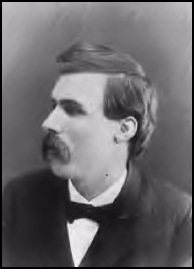 LINDBERG, John Augustus, president of the
Farmers State bank, of Dayton, Iowa, was born in
Victoria, Knox county, 111., December 29, 1850, and is a
sample of that American product known as self made men.
His parents were natives of Sweden. His father and
his grandfather served as soldiers in the regular army
of his native country. On his mother's side there were
many who assisted in making the history of that distant
northern country. Her uncle, Bishop Landgren, was very
prominent in the ministry of northern Sweden. They came to
America in October, 1849, having been three months on
the voyage, and like most emigrants of that nationality,
they made the most of the advantages afforded by their
adopted country.
Although the parents of Mr. Lindberg were
possessed of the notions of industry and close
application to work, for which the people of that tongue
are noted, they did not permit their notions in that
regard to deprive their children of the opportunities of
a good education. Mr. Lindberg was placed in the high
school at Boonesborough, and was valedictorian of his
class upon graduation. He then entered the Iowa State
university, and on June 26, 1871, graduated from the law
department of that institution. From early childhood he
was ambitious and while a mere boy began to read law,
alternating his pursuit of legal lore with contributions
to the papers, and labor on the farm, such as "dropping
corn " for his neighbors at 25 cents a day. LINDBERG, John Augustus, president of the
Farmers State bank, of Dayton, Iowa, was born in
Victoria, Knox county, 111., December 29, 1850, and is a
sample of that American product known as self made men.
His parents were natives of Sweden. His father and
his grandfather served as soldiers in the regular army
of his native country. On his mother's side there were
many who assisted in making the history of that distant
northern country. Her uncle, Bishop Landgren, was very
prominent in the ministry of northern Sweden. They came to
America in October, 1849, having been three months on
the voyage, and like most emigrants of that nationality,
they made the most of the advantages afforded by their
adopted country.
Although the parents of Mr. Lindberg were
possessed of the notions of industry and close
application to work, for which the people of that tongue
are noted, they did not permit their notions in that
regard to deprive their children of the opportunities of
a good education. Mr. Lindberg was placed in the high
school at Boonesborough, and was valedictorian of his
class upon graduation. He then entered the Iowa State
university, and on June 26, 1871, graduated from the law
department of that institution. From early childhood he
was ambitious and while a mere boy began to read law,
alternating his pursuit of legal lore with contributions
to the papers, and labor on the farm, such as "dropping
corn " for his neighbors at 25 cents a day.
Following his graduation he located at Sioux City
in connection with T. H. Conniff, and after a period of
practice there removed to Dayton and took charge of the
Dayton Review. This paper he published for ten years,
when he was appointed post-master under Garfield and
again under Harrison.
After attaining his majority, he was elected
justice of the peace, and relates many amusing incidents
of his magistracy.
His executive ability and integrity being well
known he was tendered the position of president of the
Farmers State bank, which he accepted, and which office
he now holds. It is one of the sound financial
institutions of that section of the state. Mr. Lindberg is
a republican and has done a great deal of effective
campaign work. At the time of the "late unpleasantness "
Mr. Lindberg was too young to take part, being but 13
years old at its close, but praying that it would last a
couple of years longer.
He is a member of the Masonic Order and is
treasurer of the lodge in Dayton. In his religious
belief and affiliation, he is a Unitarian. He was
married on June 7, 1874, to Amelia Brundien, and two
children have resulted from that union: Clarence John
and Arthur Channing. The former is on a ranch in Texas
and the latter a bookkeeper in the bank. In their model country home, without ostentatious
display, Mr. and Mrs. Lindberg enjoy in leisure the
company of a host of friends, by whom they are esteemed
as model entertainers.
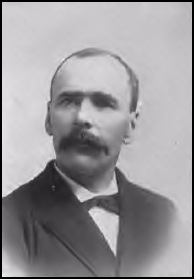 MARTIN, Wesley. Aside from the honors which,
for quite natural reasons, have been bestowed upon Mr.
Martin, Webster City's ex-mayor, ex-treasurer and
ex-city attorney, he has the distinction and the glory
which attaches to a certificate of honor signed by
Abraham Lincoln.
Mr. Martin was born at Navarre, Ohio, on December
19, 1848. He attended the common schools in the city in
which he was born and also in those of New Philadelphia.
The schools of the latter city were of a very high
character, especially while under the principalship of
Prof.
Joseph Welty. MARTIN, Wesley. Aside from the honors which,
for quite natural reasons, have been bestowed upon Mr.
Martin, Webster City's ex-mayor, ex-treasurer and
ex-city attorney, he has the distinction and the glory
which attaches to a certificate of honor signed by
Abraham Lincoln.
Mr. Martin was born at Navarre, Ohio, on December
19, 1848. He attended the common schools in the city in
which he was born and also in those of New Philadelphia.
The schools of the latter city were of a very high
character, especially while under the principalship of
Prof.
Joseph Welty.
Later he entered Eastman's Business college at
Poughkeepsie, but did not graduate. He came to Webster
City in 1876, where he began the practice of law, and
has resided there continuously since that time. His law
education was gained largely in the office of Col. A.
R. Mock, of
Cambridge, 111., with whom he studied for a period of
three years. In January, 1876, he was admitted to the
bar by the supreme court of Illinois.
The war record of Mr. Martin is one of which he
may justly feel proud. He enlisted at New Philadelphia,
Ohio, on May 2, 1864, in Company D, of the One Hundred
and Sixty-first Ohio Volunteer infantry. He was
honorably discharged from that organization at the
expiration of four months' service, that being the term
for which enlistments were made. During this period he
was in a number of skirmishes in the Shenandoah and
Kanawha valleys.
He was in the retreat from Martinsburg to
Harper's Perry, under Siegel, during the summer of 1864,
at the time General Early came down the valley, and was
also in the rifle pits on Maryland Heights during the
time that Early was besieging the garrison at Harper's
Perry and Maryland Heights. November 17,
1864, he enlisted in Company C, Second New York heavy
artillery, and was at once sent to the army at
Petersburg, Va. He participated in the closing battles
of the war around Richmond and Petersburg and was
present at the surrender of Lee on the 9th day of April,
1865. He was honorably discharged at New York city by
reason of expiration of term of service, in October,
1865. For services rendered he received a document which
is entitled:
"The President's Thanks and Certificate of
Honorable Service to Musician Wesley Martin," signed by
Eldwin M. Stanton and Abraham
Lincoln.
Mr. Martin is an active republican. He has taken
part in a number of political campaigns since coming to
Iowa, and has made many speeches under appointment by
the state committee. He was nominated for the office of
state senator by the republican convention at Eagle
Grove in 1885, but declined the nomination for business
reasons. He was mayor of Webster City from March 1,
1882, to March 1, 1883, and has also occupied the
position of city treasurer and city attorney of that
city. He is a member of the Commercial Law League of
America; also a member of the Iowa State Bar
association. He not only stands high in Grand Army
circles, but is connected with the Masons and other
orders. As
a lawyer he has a practice extending through the
different counties of the state, as well as into the
federal courts and the supreme court of the state. He
has taken an active part in the important legal
controversies in his own and adjoining counties. He was married
on December 24, 1874, to Elizabeth Wonders, at
Cambridge, 111.
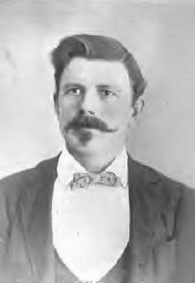 PRALL, Arthur Amin, M. D., of Dayton, Webster
county, is of German descent His father, Thomas Prall,
was a farmer in fair circumstances living in
Pennsylvania.
He was born February 15, 1836, at Washington,
Washington county, Pa., and came to Iowa in 1857,
settling in Van Buren county. September 7, 1859, he was
married to Rachel Richardson, whose father, Nathan
Richardson, was a carpenter and cabinet maker and worked
at that trade for more than fifty years. Her mother,
Sarah Richardson, was a very intelligent woman, and in
her early life learned from the Indians to use the
herbs, roots and barks which they employed to cure the
common diseases. Later in life she practiced medicine
among neighbors, who came to rely more upon her than the
regular physicians. Mrs. Prall's
ancestors were of English and Irish
descent. PRALL, Arthur Amin, M. D., of Dayton, Webster
county, is of German descent His father, Thomas Prall,
was a farmer in fair circumstances living in
Pennsylvania.
He was born February 15, 1836, at Washington,
Washington county, Pa., and came to Iowa in 1857,
settling in Van Buren county. September 7, 1859, he was
married to Rachel Richardson, whose father, Nathan
Richardson, was a carpenter and cabinet maker and worked
at that trade for more than fifty years. Her mother,
Sarah Richardson, was a very intelligent woman, and in
her early life learned from the Indians to use the
herbs, roots and barks which they employed to cure the
common diseases. Later in life she practiced medicine
among neighbors, who came to rely more upon her than the
regular physicians. Mrs. Prall's
ancestors were of English and Irish
descent.
In March, 1860, Thomas Prall and his young wife
moved to Johnson county, Iowa, and in September, 1862,
he enlisted at Iowa City in Company G, Twenty-second
Iowa volunteers. In about a month his regiment was sent
to the front and was in several of the important battles
of the war, principally under the command of Grant and
Sheridan. Returning home on the 6th of August, 1865, he
resumed the pursuit of farming in Johnson county, and in
1875 moved to Warren county, where he now owns a fruit
and stock farm of 200 acres.
Arthur A. Prall was born at Hickory Grove, near
Keosauqua, Van Buren county, July 1, 1860. During his
early childhood and while his father was in the army,
Arthur and his mother made their home with her father,
Nathan Richardson.
Young Arthur attended the common schools of
Johnson and Warren counties and the Friends' academy at
Ackworth, Warren county. He spent two years at Western
college, Toledo, Iowa, and took a three years' course at
the Iowa Eclectic Medical college at Des Moines, where
he graduated in 1887. Dr. Prall first located at Le
Grand, where he had a fair practice for a young
physician, but being anxious to do better he moved in
1888 to Pilot Mound, where he practiced very
successfully for nine years. Wishing to secure better
school advantages for his children, he removed in 1897
to Dayton Webster county, where he has a good and
rapidly growing practice. Being a studious and
progressive man, the doctor has discovered a new and
successful method of treating hernia, which has effected
some permanent cures. He also
practices a new system of reducing strangulated hernia,
which is certain and effective without resort to
knife.
In politics Dr. Prall has always been a
republican. He belongs to the Independent Order of Odd
Fellows, Modern Woodmen and Knights of Pythias. He was
married June 1, 1887, to Della E. Bufkin, of Toledo,
Iowa. They have two daughters, Pearl Ethel, born June
18, 1888, and Mae Fern, born May 28, 1890. The doctor has lately invented and applied for a
patent on a steel frame attachment to be placed on
buggies, making thereby an excellent storm cab for the
use of doctors, preachers and others obliged to be out
in all kinds of weather.
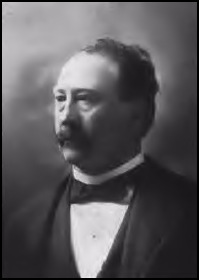 THOMAS, Zadok
Willis, a well-known lawyer and real estate man of Fort
Dodge, is the son of Quaker parents, and inherits from
them many of the staunch qualities that go to the making
of a successful and honorable career. He was born in
Columbiana county, Ohio, May 18,1856, the native state
also of his father and mother and grandparents, the
latter having been pioneer settlers. His ancestors were
of English and Welsh extraction, and several generations
preceded him in America. THOMAS, Zadok
Willis, a well-known lawyer and real estate man of Fort
Dodge, is the son of Quaker parents, and inherits from
them many of the staunch qualities that go to the making
of a successful and honorable career. He was born in
Columbiana county, Ohio, May 18,1856, the native state
also of his father and mother and grandparents, the
latter having been pioneer settlers. His ancestors were
of English and Welsh extraction, and several generations
preceded him in America.
Mr. Thomas came with his parents to Oskaloosa in
the spring of 1865. His education was obtained in the
public schools of Oskaloosa, and in a four-years' course
at Penn college. Following his college course came a
period of work as a teacher in the schools of Mahaska
county for four years. He had early
chosen for his life work the profession of law, and as a
first step to real estate business and probate law, he
studied abstracting in the office of Capt. C. P. Searle for
one year. This was followed by a year's work in the law
office of Maj. John F. Lacey, and in the fall of 1883
Mr. Thomas entered the law department of the State
university. He was graduated from this school in the
spring of 1884. Fort Dodge was chosen by him as a
location for business, and a home, and here he began, in
the fall of 1884, his successful career as a
businessman, engaging in his chosen work of real estate,
abstract, loan and law business.
Mr. Thomas has well earned his reputation, among
the citizens of Fort Dodge, as a man of ability and
possessed of all the good qualities that give a man
recognition among his fellows. In politics Mr. Thomas is
a republican. His aspirations for official positions
have not been great, believing as he does that the basis
of true political worth should first be proved by one's
works and worth as a resident citizen before aspiring to
places of trust and power. Deeply interested in the
welfare of young men who have, like himself, their own
fortunes to make, his advice is to lay good foundations
and then take advantage of every opportunity that
presents itself.
Although a Quaker by birth, Mr. Thomas is a
Methodist by adoption. He was married in 1885 to Miss
Alice Busby, a teacher of marked ability, and daughter
of a prominent farmer in Mahaska county. Mr. and Mrs.
Thomas have three children: Dana Ernest, born August 5,
1886; Lauren Hubert, born July 24, 1891, and Mildred
Irene, born April 10,1898.
The
information on Trails to the Past © Copyright may
be used in personal family history research,
with source citation. The pages in entirety may
not be duplicated for publication in any fashion
without the permission of the owner. Commercial
use of any material on this site is not
permitted. Please respect the wishes of
those who have contributed their time and
efforts to make this free site possible.~Thank
you!
|